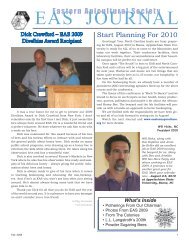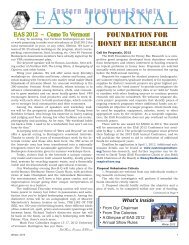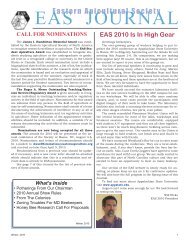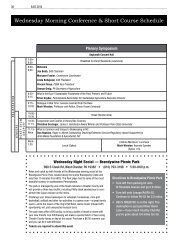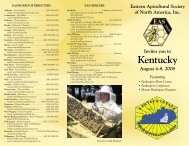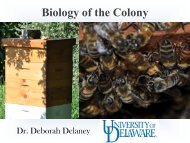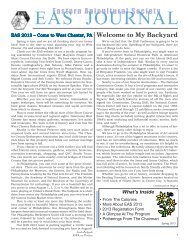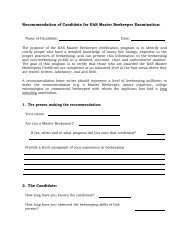Winter, 2008 - Eastern Apicultural Society of North America
Winter, 2008 - Eastern Apicultural Society of North America
Winter, 2008 - Eastern Apicultural Society of North America
You also want an ePaper? Increase the reach of your titles
YUMPU automatically turns print PDFs into web optimized ePapers that Google loves.
<strong>Winter</strong>, <strong>2008</strong>From Kentucky <strong>2008</strong> PresidentGreetings to all. I hope each <strong>of</strong> youhad a happy and healthy Holiday season.This is the time <strong>of</strong> year for reflectionon the ups and downs <strong>of</strong> the pastseason. It is a good time to formulatea plan to move toward correction <strong>of</strong>past problems, and improvement ormaintenance in the areas <strong>of</strong> your operationthat are acceptable.One <strong>of</strong> my faults (if it can be considereda fault) is that I am a prolificlist-maker. During winter months ourhouse gradually comes to resemble arat’s nest, with scraps <strong>of</strong> paper – notesand lists – everywhere by the beginning<strong>of</strong> spring. Lists have become asort <strong>of</strong> tool for me, keeping my actionsaligned with my thoughts; helping meto continue moving in the proper direction… forward. My lists are actuallyan extension <strong>of</strong> another journalistictype <strong>of</strong> tool, an annual businessplan. I have found that penning a businessplan each year is a great aid inhighlighting goals, and helping me tokeep my “eye on the ball,” so to speak.Occasionally I give one particular presentationdealing with “how to makemoney with bees.” The crux <strong>of</strong> this presentationis creating – and following –a business plan. My belief is that tobe consistently successful there mustfirst be a goal to achieve. Second, toget from point “A” to the goal, theremust be a roadmap. A business planis nothing more than a map <strong>of</strong> how youexpect to get from start to finish. Mostpeople are intimidated by even theterm “business plan”, or they see noneed for a business plan because theirbeekeeping operation is small. Don’tbe fooled by the word “business.” Theformula <strong>of</strong> following a plan works forany enterprise. If you are shovelingsnow (something I understand is probablyunderway in the <strong>North</strong>east at thetime <strong>of</strong> this writing – it is raining inWest KY…a lot) the plan would beginwith properly dressing for the task;assembling the necessary tools; plottinga start and finish; setting periodicgoals (ten feet clear, then restetc) and beginning the job. Beekeepingplans do not need to be so detailed.My goals are specific, as in “enter thehoney season with X number hiveshaving X amount <strong>of</strong> bees/brood”, andso on through the season. In order tomeet this goal there will need to bequeens raised, hives split, nucs made,hives fed – a lot – you get the idea.These are signposts on the roadmap,the business plan. They would be noless legitimate for four hives that fourthousand, just on a smaller scale.Before we started using this managementtool I had vague suppositions <strong>of</strong>where our operation stood during theyear, but nothing more concrete. I hadno clue as to the amount <strong>of</strong> revenuethat we needlessly spent each year.There is no reason to build superswhen you won’t need them for anotheryear. The money is better spent onfoundation, or frames, which shouldbe replaced much more <strong>of</strong>ten. This wasalmost an epiphany for me, and thebeginning <strong>of</strong> understanding how tokeep red ink out <strong>of</strong> the ledger.So at the time <strong>of</strong> year when NewYear’s resolutions are commonlymade, if you are searching for a worthyresolution, use this one -–createa business plan, complete with budget,for <strong>2008</strong>. Do your best to followyour plan. Make lots <strong>of</strong> notes; catalogueevery item <strong>of</strong> expense and income.Enjoy the freedom this actionwill give you. You can go to your planat any time and know what the nextstep should be. The one item thatshould be written into your plan asthe foremost principle is to never allowyour business, sideline, or hobbytake precedence over your relationshipwith family and/or friends. If you catchup with your bee-work during the Holidaysat the expense <strong>of</strong> spending timewith loved ones, you have missed thepoint <strong>of</strong> life completely. You may “love”your bees…but they will not be theones visiting you when you arehomebound in your rocking chair.Now I have to go make a list <strong>of</strong>things that need to be done.Enjoy life, family, and friends in<strong>2008</strong>…and happy beekeeping too.Kent Williams, President <strong>2008</strong>MassachusettsBeekeeper’s AssociationMass beekeepers will hold thierspring meeting at the TopsfieldFairgrounds, Topsfield, MA. Specialguest will be Tom Seeley PhD, CornellUniversity, Saturday March 29th, 9AM- 4PM. Visit www.massbee.org toregister and for additional information.Mass Beekeepers will hold thierannual Field Day on Saturday, June21st. University <strong>of</strong> MassachusettsAgronomy Farm, South Deerfield, MA.Dan Conlon, President MABeekeepers AssociationMaine State BeekeepersAssociation Annual MeetingMSBA will hold their annual meetingon Saturday, April 12, <strong>2008</strong> at theCalument Club in Augusta, Maine. Wewill have two speakers: Tom SeeleyPr<strong>of</strong>essor <strong>of</strong> Biology and ChairmanDepartment <strong>of</strong> Neurobiology and Behaviorat Cornell University whose scientificwork has focused on the behavioralanalyses <strong>of</strong> the inner workings<strong>of</strong> the honey bee colony and DavidVanderDussen, President <strong>of</strong> NOD ApiaryProducts, Frankfort, Onatario,Canada, manufacturer <strong>of</strong> Mite Away II.The meeting will have morning andafternoon lectures and a buffet lunchat noon. A silent auction with lots <strong>of</strong>bee-related stuff rounds out a funfilledday <strong>of</strong> learning and socializing.Contact Carol Cotttrill atWMBAmail@msn.com for more information.News from DEDE beekeepers are recovering fromour EAS effort.With volunteersenergized we have a busy springplanned. First up, DE ag Week Jan 8,we presented a 1/2 day workshop onvine crop pollination. As part <strong>of</strong> theprogram Bill and Nancy Troupdiscussed honey bee and Osmiapollinators, Roberta Glatz <strong>of</strong> NYdiscussed squash bees and RachelWinfree <strong>of</strong> Princeton Univ talked abouther studies on the contribution nativepollinators make to crop production oneastern farms. Mike Embrey, DeweyCaron and Bob Mitchell were on theprogram sponsored by the NE SAREgrant Farming Native Pollinators alongwith Faith Kuehn and Heather Harmon<strong>of</strong> DE Dept Ag who spoke about theproject at EAS this past summer.We will present 2-1/2 day Satshort courses in Feb and March atWarren Seaver´s in Dover for beginnersand novices. Dewey will give anintermediate/sideliner queenselection/rearing short course in Aprilat the University.The Annual DE State BeekeepersMeeting will be Saturday March 15 inDover Extension Paradee Center. Onprogram will be Dewey Caron, BartonSmith <strong>of</strong> USDA Beltsville and Rick Fell<strong>of</strong> VA Tech. Lunch is covered dish.Dewey M. Caron, Dept Entomology& Wildlife Ecology, 250 Townsend U <strong>of</strong>D, Newark, DE 19716, tel 302 831-8883Fax 302 831-8889, dmcaron@udel.edu9



